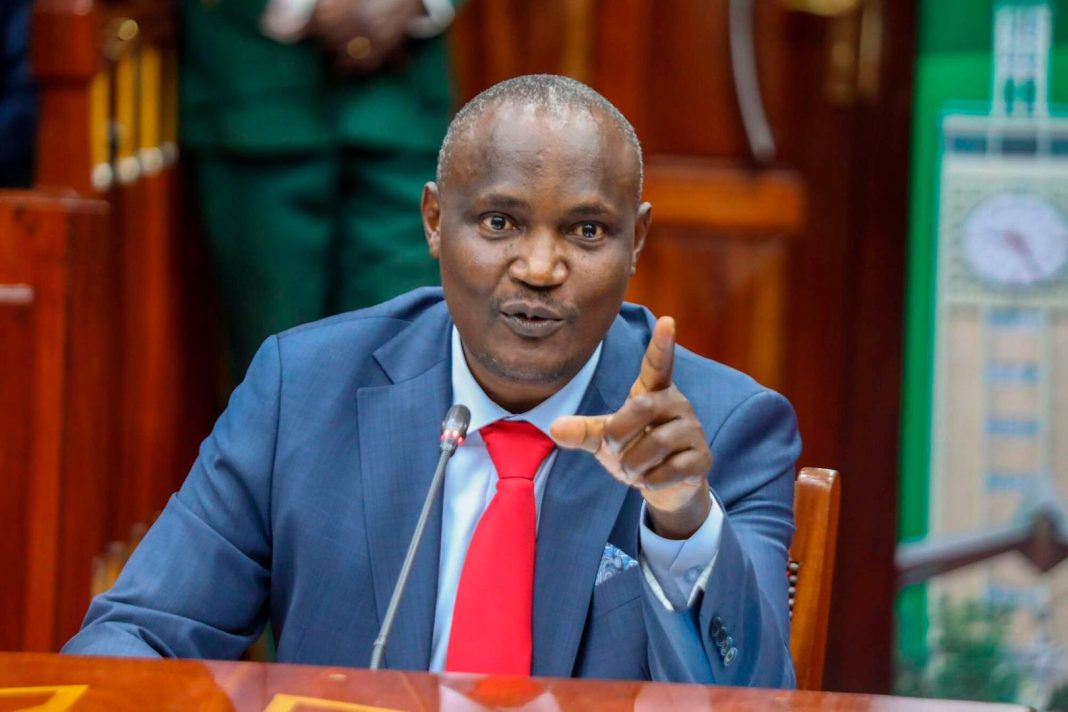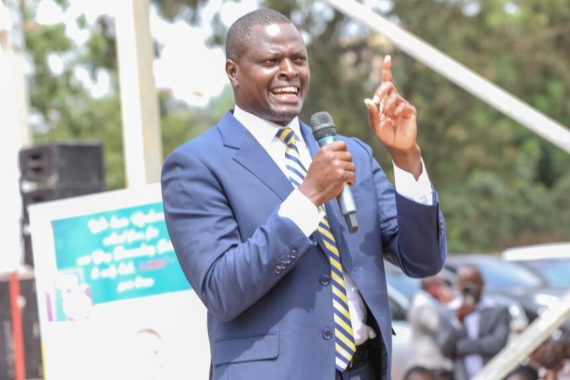John Mbadi, Kenya’s Treasury Cabinet Secretary, finds himself at a pivotal moment as the Finance Bill 2025 unfolds. Once a vocal critic of budget policies, Mbadi now faces the challenge of navigating public arguments and economic realities to deliver a budget that balances fiscal responsibility with public sentiment.
Mbadi’s journey from opposition backbencher to Treasury CS has been marked by his sharp critiques of previous budgets. In 2023, he famously criticized the Finance Act, calling it an overreach that “overtaxed Kenyans.” His stance resonated with many, especially during a period of economic strain worsen by high debt levels and inflation. However, his current role demands a shift from critique to action, as he spearheads efforts to finance the proposed Ksh4.26 trillion budget for the 2025/26 financial year.
Economists and the Parliamentary Budget Office have warned that the proposed measures could deepen the divide between rising taxes and stagnant wages, further straining vulnerable families. Mbadi has dismissed these claims, emphasizing that the budgeting process is still underway and that no final decisions have been made.
Public participation has become a cornerstone of the budget-making process, with innovative approaches like feedback via X being introduced to ensure inclusivity. Mbadi has pledged transparency, promising detailed explanations for every tax proposal once the bill is finalized. This commitment comes in the wake of heightened public observation, fueled by past protests against unpopular budget measures.
The stakes are high for Mbadi. As he works to balance competing interests, he must address concerns about Kenya’s debt sustainability while ensuring that the budget does not disproportionately burden taxpayers. His ability to navigate this complex landscape will not only define his tenure but also set the tone for Kenya’s economic path.
By Grace Githinji







[2102]888php: Best Online Casino & Slot Games in PH – Login, Register, & App Download Experience the best 888php online casino and top 888php slot games in the PH! Secure your 888php login, complete your 888php register, and get the 888php app download to start winning today. visit: 888php
online betting with paypal winnersbet
References:
karierainsports.gr
paypal casino android
References:
http://www.workbay.online
Every site featured here supports real money gameplay and has been vetted by expert team analyst
Laura Thornhill, who’s been reviewing real money online casinos Australia
for over a decade. Yes, Australians can play pokies at licensed offshore online casinos in Australia for real money.
Most real money online casinos in Australia offer some kind of bonus,
especially when you’re just starting out. Signing up with any of my recommended real money Australian online casinos gives you
access to over 5,000 games, sometimes even double that. Beyond the vast world of pokies, the top casinos in Australia
online offer an impressive mix of games designed to suit every type of player.
By reviewing hundreds of sites of we’ve managed to rank the best online casinos for Australian players.
If you’ve ever wanted to play blackjack, baccarat, or roulette from
home with a real person controlling the action, here’s your
chance. In between spins, you can explore hundreds of live dealer tables too.
Just please remember to gamble responsibly and never bet any money you cannot afford
to lose. Just make sure you understand wagering requirements before securing a tempting welcome offer.
We haven’t found a better reload bonus package anywhere else.
The minimum deposit is AU$30 across the board.
Cryptocurrency casinos are becoming popular in Australia
due to their fast transactions and privacy features.
ThunderPick Casino provides 100 free spins upon the first deposit, making it a competitive offer.
DundeeSlots offers a welcome bonus of up to AU$8,000 plus 180
free spins, and 1Red Casino provides up to AU$15,450 with free spins.
Skilled players know that strategy significantly boosts their chances of winning at blackjack.
This blend of luck and strategy appeals to a wide range of
players, from beginners to seasoned pros.
Let us first bring you up to speed on what is available at crypto casinos in terms of rewards.
Some crypto casino platform features will allow
you to make better and more informed game choices.
Players are different, we have different budgets, and we
like different casino games; in other words, it’s hard to say which crypto casino is The Best.
All our crypto casinos are categorised in terms of important features.
That is why we have created a dedicated crypto casino
games section here at CryptoGambling.com.
It only includes trusted sites with player-friendly terms and generous
rewards. Their Provably Fair mechanics make them a perfect fit for cryptocurrency play.
Popular games like Texas Hold’Em, Multi-Hand Blackjack Pro, and Lightning Roulette
are commonly available.
Rollblock is an exciting new crypto casino that offers a huge variety of games, an excellent user interface and a solid sign-up bonus.
CoinCasino is a modern crypto casino offering slots, live games, casual titles, and a full sportsbook—all under one roof.
Many of the top bitcoin casinos feature thousands of games from leading software providers, ensuring a high-quality gaming experience that caters to all types of players.
However, crypto casinos are able to be even more transparent,
as players themselves can test the randomness of a crypto
casino game using cryptographic algorithms. Traditional casino websites
simply cannot compete with the sheer number of games available at crypto casinos.
References:
https://blackcoin.co/the-match-game-rules-wins-and-popular-strategies/
In virtuellen Spielstätten, die OASIS unterstehen, können derzeit
nur Automatenspiele gespielt werden. Etwa Online Casinos aus dem EU-Ausland mit Glücksspiellizenzen von Curacao und Malta sind nicht mit dem Spielersperrsystem verbunden und können ohne Einschränkungen genutzt werden. Jenseits der virtuellen Spielstätten ohne
deutscher Lizenz ist das Spielen weiter möglich.
Es spricht nichts dagegen, sich in einem international operierenden Online Casino anzumelden, welches auch deutsche Spieler akzeptiert.
Julia Werner ist unser Rechts-, und Fakten-Experte und verantwortlich
für alle wesentlichen Inhalte rund um die gesetzliche Lage und deren Auswirkung auf deutsche Online Casino Spieler.
Auf unserer Seite findest du jedoch geprüfte Alternativen, die sowohl die Vorteile
eines offenen Angebots als auch den Schutz und die Sicherheit einer regulierten Lizenz bieten.
Und wenn diese deutsche Kunden annehmen, spricht
nichts gegen die Registrierung. Casinos ohne OASIS
bieten Spielern mehr Freiheit und Flexibilität, da keine obligatorische Sperrdatei überprüft wird.
Alle Casinos mit deutscher Lizenz sind über ein System miteinander zusammengeschlossen.
In diesem Ratgeber haben wir dir erklärt, worauf du unbedingt
achten solltest, um sicher im Online Casino ohne OASIS spielen zu können. Hier werden alle Spieler
registriert, deren Daten laut LUGAS nicht konform des
deutschen GlüStv ausfallen. Der Versuch, dich bei einem weiteren deutschen Anbieter zu registrieren, wird über dieses
System unterbunden.
References:
https://online-spielhallen.de/powerup-casino-deutschland-ihre-plattform-fur-online-gaming/
Can you be more specific about the content of your article? After reading it, I still have some doubts. Hope you can help me.
Do youu have any video of that? I’d want tto find out more details. https://Hallofgodsinglassi.wordpress.com/
Can you be more specific about the content of your article? After reading it, I still have some doubts. Hope you can help me. https://accounts.binance.info/en/register-person?ref=JHQQKNKN
Thanks for sharing. I read many of your blog posts, cool, your blog is very good. https://www.binance.info/pl/register?ref=YY80CKRN
Your article helped me a lot, is there any more related content? Thanks! https://www.binance.com/vi/register?ref=WTOZ531Y